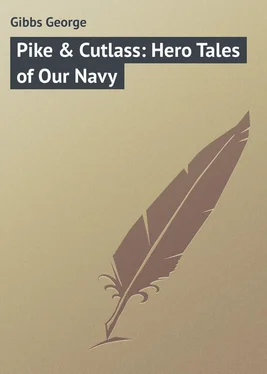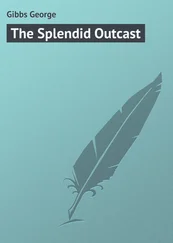George Gibbs - Pike & Cutlass - Hero Tales of Our Navy
Здесь есть возможность читать онлайн «George Gibbs - Pike & Cutlass - Hero Tales of Our Navy» — ознакомительный отрывок электронной книги совершенно бесплатно, а после прочтения отрывка купить полную версию. В некоторых случаях можно слушать аудио, скачать через торрент в формате fb2 и присутствует краткое содержание. ISBN: , Жанр: foreign_prose, на английском языке. Описание произведения, (предисловие) а так же отзывы посетителей доступны на портале библиотеки ЛибКат.
- Название:Pike & Cutlass: Hero Tales of Our Navy
- Автор:
- Жанр:
- Год:неизвестен
- ISBN:http://www.gutenberg.org/ebooks/42138
- Рейтинг книги:3 / 5. Голосов: 1
-
Избранное:Добавить в избранное
- Отзывы:
-
Ваша оценка:
- 60
- 1
- 2
- 3
- 4
- 5
Pike & Cutlass: Hero Tales of Our Navy: краткое содержание, описание и аннотация
Предлагаем к чтению аннотацию, описание, краткое содержание или предисловие (зависит от того, что написал сам автор книги «Pike & Cutlass: Hero Tales of Our Navy»). Если вы не нашли необходимую информацию о книге — напишите в комментариях, мы постараемся отыскать её.
Pike & Cutlass: Hero Tales of Our Navy — читать онлайн ознакомительный отрывок
Ниже представлен текст книги, разбитый по страницам. Система сохранения места последней прочитанной страницы, позволяет с удобством читать онлайн бесплатно книгу «Pike & Cutlass: Hero Tales of Our Navy», без необходимости каждый раз заново искать на чём Вы остановились. Поставьте закладку, и сможете в любой момент перейти на страницу, на которой закончили чтение.
Интервал:
Закладка:
In the meanwhile Captain Burdon, finding that his boat’s crew did not return, got up his anchor, shook out his sails, and cleared ship for action. He was already suspicious, and too good a seaman to let unpreparedness play any part in his actions. There was not very much wind, and slowly the “Drake” bore down on the silent vessel which lay, sails flapping idly as she rolled, on the swell of the Irish Sea. As the afternoon drew on the wind almost failed, so that it was an hour before sunset before the “Drake” could get within speaking range. Hardly a ripple stirred the surface of the glassy swells, and the stillness was ominous and oppressive.
When within a cable’s length of the “Ranger” Captain Burdon sent up his colors. Captain Jones followed his lead in a moment by running up the Stars and Stripes.
Suddenly a voice, looming big and hoarse in the silence, came from the “Drake,” —
“What ship is that?”
Paul Jones mounted the hammock nettings and, putting his speaking-trumpet to his lips, coolly replied, —
“The American Continental ship ‘Ranger.’ We have been waiting for you. The sun is but little more than an hour from setting, and it is time to begin.”
Then he turned and gave a low order to the man at the wheel, and the “Ranger” wore around so that her broadside would bear. Paul Jones always believed in striking the first blow. When they came before the wind the word was passed, and a mass of flame seemed to leap clear across the intervening water to the “Drake.” The “Ranger” shuddered with the shock and felt in a moment the crashing of the other’s broadside through her hull and rigging. The battle was on in earnest. Yard-arm to yard-arm they went, drifting down the wind, and the deep thundering of the cannonade was carried over to the Irish hills, where masses of people were watching the smoke-enveloped duel. The sun sank low, touching the purple hilltops, a golden ball that shed a ruddy glow over the scene and made the spectacle seem a dream rather than reality. Still they fought on.
It was a glorious fight – and as fair a one as history records. The “Drake” pounded away at the “Ranger’s” hull alone, while Jones was doing all he could with his smaller pieces to cripple his enemy’s rigging. First the “Drake’s” fore-tops’l yard was cut in two. The main dropped next, and the mizzen gaff was shot away. For purposes of manœuvring, the “Drake” was useless and drifted down, her jib trailing in the water and her shrouds and rigging dragging astern. She was almost a wreck. As she heeled over on the swell, the gunners on the “Ranger” could see human blood mingling with the water of the division tubs that came from her scuppers. The first flag was shot away, but another was quickly run up to its place. In a moment that too was shot away from the hoisting halyard and fell into the water astern, where it trailed among the wreckage. But still she fought on.
On the “Ranger” the loss had been comparatively slight. Lieutenant Wallingford and one other man had been killed and there were five or six wounded men in the cockpit. Jones seemed to be everywhere, but still remained uninjured and directed the firing until the end. He saw that the sharpshooters in his tops were doing terrific execution on the decks of his adversary, and at last he saw the imposing figure of Captain Burdon twist around for a second and then sink down to the deck. Another officer fell, and in a moment above the crash of division firing and the rattle of the musketry overhead he heard a cry for quarter.
The battle was at an end in a little over an hour. It was almost as great a victory as that of the “Bonhomme Richard” over the “Serapis.” Paul Jones’s ship carried eighteen guns; the Englishman carried twenty. The “Ranger” had one hundred and twenty-three men; the “Drake” had one hundred and fifty-one and carried many volunteers besides. The “Ranger” lost two killed and had six wounded; the “Drake” lost forty-two killed and wounded. Against great odds John Paul Jones still remained victorious.
The people on shore heard the cannonading cease and saw the great clouds of gold-tinted smoke roll away to the south. There they saw the two vessels locked as if in an embrace of death and a great cheer went up. They thought the “Drake” invincible. The gray of twilight turned to black, and the ships vanished like spectres in the darkness. But late that night some fishermen in a boat came ashore with a sail from the store-room of the “Drake.” They said it had been given them by John Paul Jones. The people knew then that the “Drake” had been captured.
When the “Ranger” returned with her prizes to Brest, and his people told the tale of Paul Jones’s victory, France was electrified. Neither in France nor in England would they at first believe it. France made him her hero. England offered ten thousand guineas for his head.
A STRUGGLE TO THE DEATH
Never, since the beginning of time, has there been a fiercer sea-fight than that between the “Bonhomme Richard” and the “Serapis.” No struggle has been more dogged – no victory greater.
Three – four times during the night-long battle any other man than Paul Jones would have struck his colors. His main-deck battery and crews blown to pieces – his water-line gaping with wounds – his sides battered into one great chasm – still he fought on. His prisoners released – his masts tottering – his rudder gone – his ship afire below and aloft, his resistance was the more desperate. The thought of surrender never occurred to him.
After taking the “Drake” in a gallant fight, burning Whitehaven, and terrorizing the whole British coast, Paul Jones went to Paris, where a commission to the converted East Indiaman, the “Bonhomme Richard,” awaited him. Putting her in the best shape possible, he boldly steered across for English waters. Paul Jones thirsted for larger game.
When Captain Pearson, with the new frigate “Serapis,” on a fine September afternoon in 1779, sighted Paul Jones, he signalled his merchant convoy to scatter, and piped all hands, who rushed jubilantly to quarters. The opportunity of his life had come, for the capture of the rebel frigate meant glory and a baronetcy. But he reckoned without his host.
Across the oily waters came the cheery pipes of the boatswain’s mate of the “Richard” as Jones swung her up to meet her adversary, and Pearson knew his task would not be an easy one. The wind fell so light that the sun had sunk behind the light on Flamborough Head before the ships drifted up to fighting distance, and it was dark before they were ready to come to close quarters. On the “Bonhomme Richard,” Jones’s motley crew, stripped to the waist, were drawn up at the guns, peering out through the ports at the dark shadow on the starboard bow they were slowly overhauling.
The decks were sanded, the hammocks piled around the wheel, and there at the break of the poop stood the captain, trumpet in hand, turning now and then to give an order to Richard Dale or his midshipmen, quiet and composed, with the smile on his face men saw before the fight with the “Drake.” The clumsy hulk rolled to the ground-swell, and the creaking of the masts and clamping of the sheet-blocks were all that broke the silence of the night. No excitement was apparent, and the stillness seemed the greater for an occasional laugh from the gunners, or the rattle of a cutlass newly settled in its sheath.
Then close aboard from out the blackness came a voice, —
“What ship is that?”
Paul Jones moved to the lee mizzen-shrouds and slowly replied, —
“I can’t hear what you say.”
He wanted all of his broadside to bear on the Englishman.
“What ship is that? Answer, or I shall fire.”
Читать дальшеИнтервал:
Закладка:
Похожие книги на «Pike & Cutlass: Hero Tales of Our Navy»
Представляем Вашему вниманию похожие книги на «Pike & Cutlass: Hero Tales of Our Navy» списком для выбора. Мы отобрали схожую по названию и смыслу литературу в надежде предоставить читателям больше вариантов отыскать новые, интересные, ещё непрочитанные произведения.
Обсуждение, отзывы о книге «Pike & Cutlass: Hero Tales of Our Navy» и просто собственные мнения читателей. Оставьте ваши комментарии, напишите, что Вы думаете о произведении, его смысле или главных героях. Укажите что конкретно понравилось, а что нет, и почему Вы так считаете.












